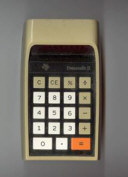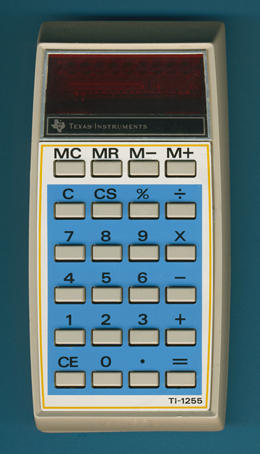
DATAMATH CALCULATOR MUSEUM
 |
DATAMATH CALCULATOR MUSEUM |
Texas Instruments TI-1255 (Prototype)
| Date of introduction: | (1976) | Display technology: | LED-stick |
| New price: | Display size: | 8 | |
| Size: | 5.5" x 2.8" x
1.4" 138 x 70 x 35 mm3 |
||
| Weight: | 3.9 ounces, 110 grams | Serial No: | 1242627 |
| Batteries: | 9V | Date of manufacture: | wk 16 year 1976 |
| AC-Adapter: | AC9180 | Origin of manufacture: | USA (LTA) |
| Precision: | Integrated circuits: | TMS0972 | |
| Memories: | 1 | ||
| Program steps: | Courtesy of: | Joerg Woerner |

![]()

 Texas
Instruments took in 1976 in conjunction with mathematics educators at two major
universities an initiative to introduce a group of 6 calculators for educational
use. Including the Little Professor,
the limited function ABLE calculator, the colorful TI-1205
and TI-1255, the TI-30 and the
sophisticated SR-51-II, these
calculators helped students understand and use math concepts from kindergarten
through college and career.
Texas
Instruments took in 1976 in conjunction with mathematics educators at two major
universities an initiative to introduce a group of 6 calculators for educational
use. Including the Little Professor,
the limited function ABLE calculator, the colorful TI-1205
and TI-1255, the TI-30 and the
sophisticated SR-51-II, these
calculators helped students understand and use math concepts from kindergarten
through college and career.
The TI-1255 is based on the TI-1250
but includes rechargeable NiCd-batteries instead the standard 9V block battery.
To enhance the readability of the keyboard both the size of the numerals and the
color-scheme was improved.
![]()

 The featured TI-1255
with
Date code 1676 LTA and manufactured in April
1976 in Lubbock, Texas reveals an internal construction identical with the
TI-1250 Version 3 with a single-sided printed circuit
board (PCB) centered around a TMS0972 single-chip
calculator circuit based
on the TMS1000,
the World's first Microcomputer.
The featured TI-1255
with
Date code 1676 LTA and manufactured in April
1976 in Lubbock, Texas reveals an internal construction identical with the
TI-1250 Version 3 with a single-sided printed circuit
board (PCB) centered around a TMS0972 single-chip
calculator circuit based
on the TMS1000,
the World's first Microcomputer.
This TI-1255 is probably an early
design study or was used for sales demonstrations. We found several hints supporting this assumption:
|
• The calculator is powered with a 9V battery instead the expected two rechargeable AA-sized batteries. • The black label on the back of the calculator reads TI-1250 while a known later model sports a white TI-1255 label. • The earliest calculators of the TI-1205, TI-1255 and TI ABLE trio in the final design (NiCd batteries, white labels) were manufactured in September 1976 while this model was assembled already in April 1976. |
The TI-1255 is one of the rarest members in the TI-12xx line and was sold only in the US.
Fellow collectors - if you own a Texas Instruments TI-1255 calculator, please report us the serial number and date code from the back of the calculator for our Database.
Don’t miss the LADY 1200, a design developed by marketing guys to attack women’s hand-bags.
 On September 17, 2009 we were able to celebrate
reunion of the calculators featured in the TI Learning Center
Sales Leaflet CB-272 including three of the rarest portable electronic calculators.
On September 17, 2009 we were able to celebrate
reunion of the calculators featured in the TI Learning Center
Sales Leaflet CB-272 including three of the rarest portable electronic calculators.
| TI-1255.
A rechargeable, full-function capability calculator with automatic
constant and 4-key memory.
Texas Instruments rechargeable TI-1255 is well-suited for students in fundamental mathematics curricula. It includes the same features as the TI-1205, plus independent memory and change-sign key for entering negative numbers. Using the TI-1255’s versatile memory system, students are able to store intermediate results and answers as they explore secondary level math topics. Students may add to [M+] or subtract from [M-] memory a displayed number without affecting the calculation in process. Stored numbers may be displayed by using memory recall [MR], and the memory can be cleared [MC] without clearing the calculator. Convenient algebraic entry allows students to enter problems in the same order they would write them on paper. A touch of the change-sign key [CS] changes the displayed number from positive to negative or vice versa, and the bright 8-digit display and large keyboard numerals offer good visibility. A
supplement learning package “Calculator Math™ Fundamental
Mathematics”, was developed and tested by the © Texas Instruments, 1976 |
If you have additions to the above article please email: joerg@datamath.org.
© Joerg Woerner, October 22, 2009. No reprints without written permission.